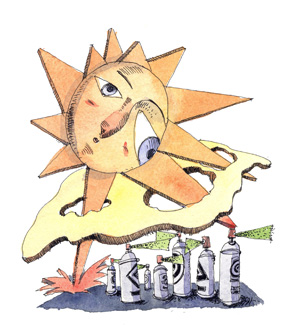|
||
      |
Peer Review ::
From our pages
 1912 On a June Tuesday that was “brilliantly clear but not hot,” delegates from 60 universities met for the William Rainey Harper Memorial Library dedication, including Booker T. Washington, representing Tuskegee Normal and Industrial Institute. Board of Trustees president Martin Ryerson handed the “huge and symbolic” library keys to President Harry Pratt Judson, who in turn gave them to Director of University Libraries Ernest DeWitt Burton. The Magazine’s editors recalled the event in the July issue, particularly how, later that night, Harper Library’s “facades, massive in the starlight, loomed all the more magnificent for the absence of detail.”
1912 On a June Tuesday that was “brilliantly clear but not hot,” delegates from 60 universities met for the William Rainey Harper Memorial Library dedication, including Booker T. Washington, representing Tuskegee Normal and Industrial Institute. Board of Trustees president Martin Ryerson handed the “huge and symbolic” library keys to President Harry Pratt Judson, who in turn gave them to Director of University Libraries Ernest DeWitt Burton. The Magazine’s editors recalled the event in the July issue, particularly how, later that night, Harper Library’s “facades, massive in the starlight, loomed all the more magnificent for the absence of detail.”
1957 “Writing is a passionate and unthinking activity. It has nothing to do with cognizant, rational activities,” Saul Bellow, AB’36, told creative-writing students in a late-spring visit to campus. “This voluntary restriction of imagination with only experienced experience is a limit to the power people feel,” he cautioned. “Don’t let realistic details become the whole thing.” The June Magazine included photos of Bellow with a room of earnest-looking listeners, offering one-on-one advice, and visiting Goff House at 1326 E. 57th St., one of the rooming houses he lived in as a student.
1982 In the Summer issue, editor Felicia Antonelli Holton, AB’50, interviewed visiting theology professor Hans Küng, asking him about rationalism, the possibility of definitive truth, and the doctoral seminar he taught on his book Does God Exist? Holton put that same question to Küng, a Roman Catholic theologian from West Germany’s University of Tübingen, who responded, “In modern times, if you will really give an answer to the question of God, you cannot simply say ‘yes.’” The question, Küng estimated, takes “a few hundred pages” to answer, but his reply came down to a “yes.”
1997 “I’d come home at the end of the day, and my wife would ask how the work was going. ‘Good,’ I’d say, ‘but it might mean the end of the world,’” F. Sherwood Rowland, SM’51, PhD’52, told the Magazine in August. Rowland shared the 1995 Nobel Prize in chemistry with Mario Molina and Paul Crutzen for their discovery that chloroflourocarbons—often found in aerosols—contribute to the destruction of the ozone layer